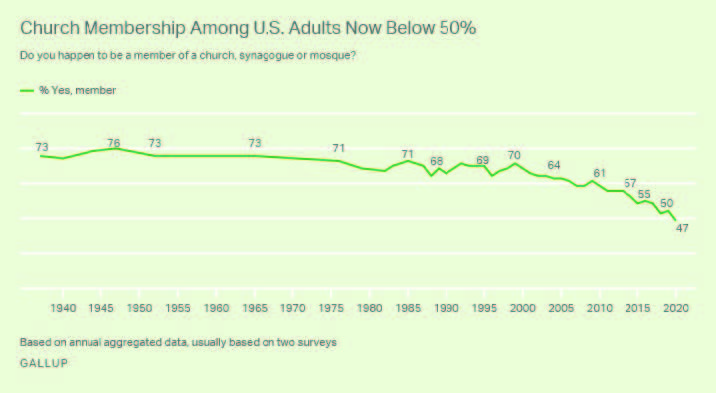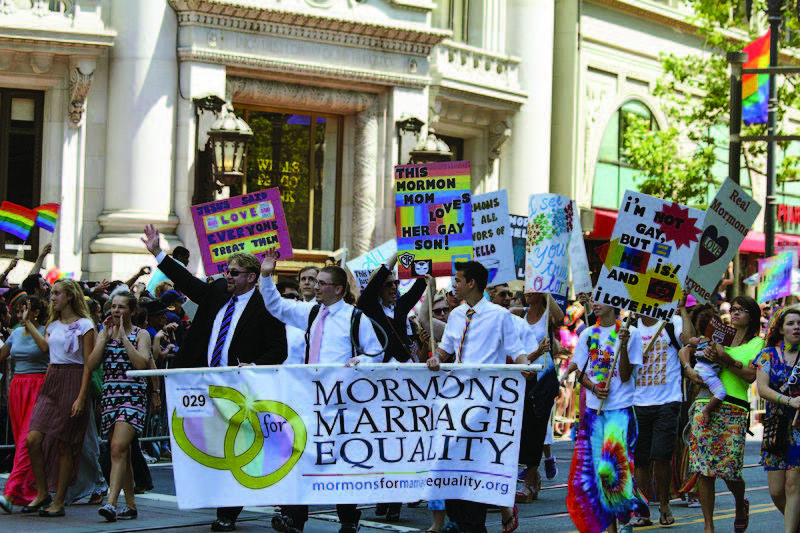
A new Gallup Poll finds that for the first time since it began collecting data on church![]() membership in the late 1930s, fewer than half of Americans say they belong to a religious congregation. The new survey finds that 47 percent of Americans now say they belong to a house of worship, decreasing from 70 percent in the mid-1990s and 50 percent in 2019. The decline is part of a trend of declining congregational membership since the 1990s, according to Gallup data. When Gallup first started measuring church membership in 1937, nearly three-quarters of the population reported membership in a congregation. Since that time, membership remained at about 70 percent until falling rates accelerated in the late 2000s.
membership in the late 1930s, fewer than half of Americans say they belong to a religious congregation. The new survey finds that 47 percent of Americans now say they belong to a house of worship, decreasing from 70 percent in the mid-1990s and 50 percent in 2019. The decline is part of a trend of declining congregational membership since the 1990s, according to Gallup data. When Gallup first started measuring church membership in 1937, nearly three-quarters of the population reported membership in a congregation. Since that time, membership remained at about 70 percent until falling rates accelerated in the late 2000s.

![]()
Only eight percent of former Mormons list “the church’s strong culture of political conservatism” as one of their main reasons for leaving, and it is not very high on the list, according to a recent study. Compiling available social science data, Jana Riess and Benjamin R. Knoll observe in their study published in the Mormon Studies Review (Vol. 8) that religious reasons come out at the top of listed explanations for leaving the church, with former members no longer believing in Mormon faith and values, though political factors may get mixed in among those lists. They find many of the political views of a majority of former Mormons to not be dramatically different from those of active ones, although less conservative on average, showing some level of correlation.
It is also true that a substantially smaller percentage of former Mormons belong to the Republican Party compared to current members of the church (with a difference of 20 percentage points). They might, however, be described as “not so much liberal as less conservative, on average.” Some issues appear to matter more to some groups. For instance, younger respondents mentioned LGBT issues quite frequently among their reasons for leaving, and women of all generations showed dissatisfaction about women’s role, while this issue was ranked much lower by male former members. Former Mormons appear rather conservative when it comes to limiting the role of government, but they differ significantly from active members on social issues, especially homosexuality, same-sex marriage, and abortion.
(Mormon Studies Review, https://www.press.uillinois.edu/journals/msr.html)

Mormons for Marriage Equality, June 30, 2013 (Quinn Dombrowski, Berkeley – Creative Commons, Wikipedia).
![]()
 Conservative religious groups and leaders are increasingly facing censure by big tech companies, according to a report by the Napa Legal Institute. So far this year, religious groups and figures have been silenced by tech companies at a rate of about one a week, according to the study by the conservative institute cited in the Wall Street Journal (March 29). LifeSiteNews, a prolife religious news website, had its YouTube channel permanently banned by Google, which deleted all its videos. Google justified its action as a response to Covid-19 misinformation, though it would not tell the site which video had offended its standards. Google had flagged LifeSiteNews for a video of an American Catholic bishop criticizing vaccines developed with fetal cells. In January, Bishop Kevin Doran of Ireland was removed from Twitter after he criticized assisted suicide laws. The company reversed its decision after public opposition. In January, Twitter blocked a post by the Daily Citizen, a site run by the evangelical group Focus on the Family, suspending its account. The reason given was that a tweet challenged the “underlying premise of transgenderism.”
Conservative religious groups and leaders are increasingly facing censure by big tech companies, according to a report by the Napa Legal Institute. So far this year, religious groups and figures have been silenced by tech companies at a rate of about one a week, according to the study by the conservative institute cited in the Wall Street Journal (March 29). LifeSiteNews, a prolife religious news website, had its YouTube channel permanently banned by Google, which deleted all its videos. Google justified its action as a response to Covid-19 misinformation, though it would not tell the site which video had offended its standards. Google had flagged LifeSiteNews for a video of an American Catholic bishop criticizing vaccines developed with fetal cells. In January, Bishop Kevin Doran of Ireland was removed from Twitter after he criticized assisted suicide laws. The company reversed its decision after public opposition. In January, Twitter blocked a post by the Daily Citizen, a site run by the evangelical group Focus on the Family, suspending its account. The reason given was that a tweet challenged the “underlying premise of transgenderism.”
Twitter also suspended Catholic World Report, though it later admitted it had erred. Meanwhile, Amazon banned Ryan Anderson, head of the Ethics and Public Policy Center, over his book criticizing transgenderism, When Harry Became Sally. Books from specific publishers are targets of such restrictions, such as Catholic TAN Books. The publisher currently cannot advertise books by authors Paul Kengor and Carrie Gress, who wrote a book on “rescuing the culture from toxic femininity.” Facebook banned ads for Kimberly Cook’s anti-feminist book, Motherhood Redeemed. The report notes that when posts are removed, ads are blocked, and accounts are banned, public pushback and media criticism often lead tech companies to rethink their actions.
![]()

Source: https://www.flickr.com/photos/wallyg/1098358215 (Creative Commons)
What is called “Covid fundamentalism,” meaning resistance to public health measures during the pandemic for religious reasons, has not been strongly evident in churches and denominations in Eastern and Central Europe, according to a recent study. Recent reports have suggested that some Eastern Orthodox churches, especially in Russia and Greece, have been less compliant with government lockdowns and other precautions concerning Covid-19, often persisting in offering communion to members and keeping monasteries and churches open. But the study of churches in Eastern and Central Europe, with a special focus on Ukraine, conducted by Vita Tytarenko and Iryna Bogachevska and published in the journal Occasional Papers on Religion in Eastern Europe (February), found that such “fundamentalism” did not become widespread among these churches. While in analyzing the reactions of different Christian churches in the region the researchers did find a segment of believers who disagreed with lockdown restrictions, there was found to be no “direct correlation between the manifestations of ‘COVID fundamentalism’ and the level of religiosity of the population of the analyzed countries…” It was difficult to make generalizations about each country because of their religious pluralism, but conspiracy theories, such as denying the virus and claiming it was used as an anti-Christian plot, tended to find a hearing among conservative circles of Eastern Orthodox believers. Conspiracies about the dangers of modernism for Orthodoxy have circulated since the fall of communism, and Covid-19 suspicions fit into this mindset.
(Occasional Papers on Religion in Eastern Europe, https://digitalcommons.georgefox.edu/ree/vol41/iss1/4/)